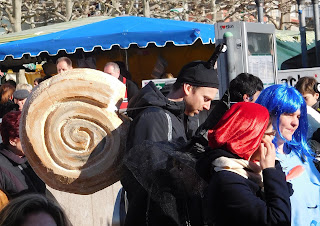The week before the beginning of Lent (which is the catholic practice of fasting from something - often meat, sweets, fats, rich foods - for 40 days before Easter) is marked by celebrations worldwide. Carnival in Brasil, Mardi Gras (Fat Tuesday) in New Orleans. In Germany it is called Fasching.
People dress in costumes like at Halloween.
They join clubs: young children to grown adults doing close order drills in silly uniforms.
They form marching bands to give adults a chance to dress up in expensive and bizarre costumes/uniforms, march in a parade and play music with friends. They don't have high school marching bands in Germany, so this is their equivalent.
People go in costume to dinners with hundreds of friends in very crowded halls where the entertainment is comics in absurd hats reciting satirical poetry with a special cadence and with group chanting, clapping and drum rolls. Seriously. They do that for HOURS.




We happened to be downtown in Frankfurt on Saturday at the time the Children's parade
was winding it's way down the Zeil (the main shopping district).
"In parts of East and South Germany, as well as in Austria, carnival is called Fasching. In Franconia and Baden-Württemberg as well as some other parts of Germany, the carnival is called Fas(t)nacht or Fasnet; in Switzerland, Fasnacht.
"Germany's carnival traditions are mostly celebrated in the predominantly Roman Catholic southern and western parts of the country. It is traditionally connected with farm servants or generally young men going from house to house in the villages and collecting sausages, eggs and bacon, which was consumed in a festivity on the same evening. While going from house to house they wore masks and made noise. The old tradition vanished in many places, in other places under influence of German carnival traditions it came to resemble carnival with its parades.Although the festivities and parties start as early as the beginning of January, the actual carnival week starts on the Fat Thursday (Weiberfastnacht) before Ash Wednesday (in Germany). The big German carnival parades are held on the weekend before and especially on Rosenmontag, the day before Shrove Tuesday, and sometimes also on Shrove Tuesday (Faschingsdienstag or Veilchendienstag) itself in the suburbs of larger carnival cities."
After watching the parade, we walked over to the Dom, the big cathedral in town. It is under repairs on the east end, but the tower is still cool.

The new history museum that they are building on top of the ruins of the Roman village is really huge. The ruins will be on the bottom floor.



And I love the colors of paint on the homes.

This is what I love about German: how they construct words: This one is an "Up -Down-Machine-Room" : where the motors are to run the elevator.

























No comments:
Post a Comment